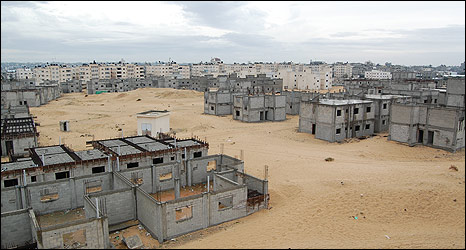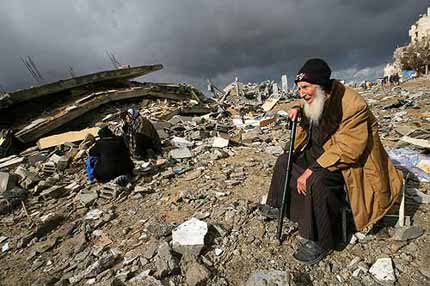Gaza: One Year On: Al Jazeera online
Displaced and desperate in Gaza
By Safa Joudeh in Gaza
A year after the war, many displaced families still live in tents [GALLO/GETTY]
One year has passed since the beginning of Operation Cast lead, Israel’s 22-day military assault on the besieged Gaza Strip and suspended is a word that best describes daily life in the Strip; the internal reconciliation process, peace talks with Israel, and most importantly, reconstruction being halted until further notice.
On the street, conversations shift between two topics: The first is the ‘internal peace process’ between rival parties Fatah and Hamas. The other is a possible, even partial opening of the borders by Israel to allow rebuilding to begin; a topic alluded to casually with much cynicism and little hope.
Israeli ground and air raids between December 27, 2008 and January 17, 2009 left extensive damage and mass devastation in its wake.
Factories, businesses, public service buildings, farms, mosques and schools were targeted, hundreds destroyed or damaged. About 15,000 homes were either demolished or severely damaged.
One year later and 20,000 people are still displaced, living with relatives, or in makeshift shacks. Many of them have almost resigned themselves to living in temporary accommodations permanently.
‘Help is not coming’
Abu Subhi, a resident of Beit Lahi, is one of thousands who received a tent from the Red Cross, following the destruction of his home during the war on Gaza.
Today, his tent serves as an extra room to an adjoining shack he built from wooden planks and corrugated iron sheets to house his family.
“I used to have a home and six children. My oldest son was killed in the war and I lost my home. It has been one year and all I’ve gained is the knowledge that help is not coming. The siege before the war was brutal. The siege after the war is pure evil,” he says.
And while a small number of displaced families remain in tents, shacks like Abu Subhi’s have sprung up on the sites of demolished homes all over the Strip.
The few who can afford it have rented apartments, but in one year not one single house has been rebuilt.
Nevertheless, there have been efforts on the part of international NGOs to prepare for the reconstruction of public and private buildings.
The United Nations Development Program (UNDP) launched a rubble removal project that discarded 600,000 tonnes of rubble left over after the war, as part of its early recovery process.
Frustration and despair
The images of the mounds of rubble in the Zeitoun neighbourhood of Gaza City, one of the areas most heavily hit during the war, became representative of the scale of the destruction left behind.
Today, the same areas of this neighbourhood have been cleared, and where residents hoped new homes would be built, shacks, trailers and even mud houses have been erected.
According to a report issued by the UN Conference on Trade and Development, the damage to the civilian infrastructure after the war equals four times the size of the Gaza economy.
Over $4bn were pledged by the international community for reconstruction in March.
The reconstruction process would not only put the Strip on the road to recovery, but would also provide hundreds of thousands of jobs in a multitude of sectors, and assist in decreasing the unprecedented 60 per cent unemployment rate.
But, the continued indefinite delay has created an overwhelming sense of frustration and despair among Gazans.
‘Downhill from rock bottom’
At least 20,000 people were displaced by Israel’s war on Gaza [EPA] In the vegetable market in Gaza City vendors arrange and rearrange their produce, occasionally catering to the odd customer; a far cry from the hustle and bustle of what was once one of the liveliest areas in Gaza.
Raafat Hijazi supports a family of 15, his wife and three daughters, in addition to 11 nephews and nieces whose parents – Rafaat’s brothers and their wives – were killed during the Israeli aggression.
Raafat considers himself fortunate. Although business is slow, there will always be customers to buy his fruit and vegetables.
“Before the war we thought it could not get any worse. But despite the siege, things weren’t as bleak as they are now. You really can go downhill from rock bottom. At most only 10 truckloads of produce are allowed in through the Israeli controlled crossings,” he says.
This is compared to 70 truckloads during the two year blockade preceding the war on Gaza; already only 25 per cent of the amount required to meet the needs of the population.
Paying tunnel prices
But the tunnels between Gaza and Egypt are yet again a means to make up the shortages of produce in the market.
Items such as oranges and Guava are now being brought in through the tunnels.
But Raafat points out that the prices are so high, shoppers prefer not to waste money on what they call ‘luxury items’ such as fruit.
“By the time the produce, or any other items, make it to the stalls and shelves in the market they cost three or four times as much as they typically should,” he explains.
The same goes for items ranging from fish and cattle, to electronics, clothing and fuel, each ranging in the disparity between original price and tunnel price.
On one hand, the tunnels allow for the entry of necessities that would otherwise not be available, on the other tunnel trade is costly to both merchants and customers.
During the past 12 months the amount and range of items brought in through the tunnels has increased significantly, a development resulting directly from Israel’s tightening of the siege on the Strip.
Today, 15 per cent of food requirements in the Gaza Strip are being met by items that come in through tunnels, and yet 76 per cent of the population has become food insecure, as opposed to 53 per cent before the war.
‘Dying a slow death’
But despite ingenuity in dealing with the challenges posed by the continued blockade, Israel’s war on the Strip, resulted in billions of dollars worth of damage to the civilian infrastructure, which was already suffering major breakdowns following a two year blockade before the war.
One year later, electricity, water and sanitation systems not only fall short of providing the residents of the Strip with the minimum supply required for each household, but are also on the verge of collapse.
One fifth of the Gaza shore is polluted due to improper disposal of waste water into the sea. The waste water system sustained extensive during the war, and one year later there have been no repairs or maintenance.
A large portion of the costal area in Gaza is not fit for swimming or fishing, depriving Gazans of one of their only recreational outlets and most important industries.
But the majority of the population believes that this is the lesser of two evils.
In the town of Khan Younes in the central Gaza Strip locals are only too familiar with the occurrence of sewage water flooding their streets and even their homes.
Nabil Shakshak, a schoolteacher and father of three, lives only metres away from a sewage lake, created as a temporary holding place for the neighbourhood’s waste water until reconstruction of a waste water treatment plant can begin.
“This is a health and environment hazard,” he says. “My children are constantly sick, the ground, air and water we drink is contaminated.”
“What we don’t understand is that the resources, the funding, the workers, the skill, it’s all there. We’re dying a slow death because Israel chooses to say no repairs can be made. Someone explain this to my children.”
Nabil’s sentiments are not uncommon among the population of the Gaza Strip.
Many also believe that until the international community actively takes a stand against Israel’s collective punishment measures, Israel will never allow the rebuilding process to begin.
Israel Defends Its Inquiry Into Gaza War: New York Times
By ISABEL KERSHNER
Published: January 29, 2010
JERUSALEM — Israel sent a letter to the United Nations secretary general, Ban Ki-moon, on Friday, defending the credibility of its internal military investigation into the Israeli Army’s conduct during last winter’s Gaza war.
Israel Signals Tougher Line on West Bank Protests (January 29, 2010)
The 40-page document was the first official Israeli response to a harshly critical United Nations study called the Goldstone report and formed part of Israel’s effort to stave off accusations of war crimes.
But the document did not address the possibility of an independent, nonmilitary commission of inquiry, as called for by the United Nations report into the war and by many concerned parties in Israel and abroad.
A copy released by the Israeli Foreign Ministry late Friday outlined the findings so far of various kinds of military investigations into several episodes. Among the conclusions, Israel stated that “the strategies adopted by Hamas, and in particular its systematic entrenchment in the heart of civilian areas, created profound operational dilemmas.” The document also declared that in complex combat situations, errors of judgment, even with tragic results, did not necessarily mean that war crimes had occurred.
The Israeli government has been considering the establishment of some kind of judicial investigative committee. While some prominent Israelis favor one, others have been opposed, including the defense minister, Ehud Barak. “All of the soldiers and officers whom we sent into battle need to know,” Mr. Barak said Friday, “that the State of Israel stands behind them, also the day after.”
The report, which was published in September, accused mainly Israel, but also Hamas, which controls Gaza, of possible war crimes during the three-week war. It was researched and written by a fact-finding mission created by the Human Rights Council and led by the respected international jurist Richard J. Goldstone, a South African judge and veteran war crimes prosecutor. In November, the General Assembly endorsed the Goldstone report and asked the secretary general to report back by Feb. 5 on Israeli and Palestinian progress in investigating their respective roles in the war.
Among other things, the report accused Israel of deliberate attacks against the civilian population of Gaza and of willful destruction of civilian infrastructure, a violation of international law.
Up to 1,400 Gazans were killed, including hundreds of civilians. Israel rejected the Goldstone report as biased.
The Palestinian ambassador to the United Nations, Riyad Mansour, said that the Palestinian government had delivered a letter to the secretary general saying it had established a special commission that would review the accusations raised in the Goldstone report and carry out whatever investigations the commission deemed necessary.
The report accused Hamas of firing rockets into Israel from Gaza, and Hamas said separately that it had responded to the United Nations demands for an investigation by calling Israeli civilian deaths a “mistake.”
The report called for “appropriate investigations that are independent and in conformity with international standards” into what it called “serious violations” of international law.
If no good-faith, independent investigations were under way within six months, the report recommended, the Security Council should refer the Gaza case to the International Criminal Court.
Many in Israel argue that the military investigation is not enough. Israel’s attorney general, Menachem Mazuz, said Israel was at risk of “Serbianization,” even though he considered the Goldstone report biased.
“Therefore, I believe that Israel has a clear interest in conducting a serious, expert examination that will deal with the report and produce an opposing report,” Mr. Mazuz said in an interview published Friday in the newspaper Haaretz.

